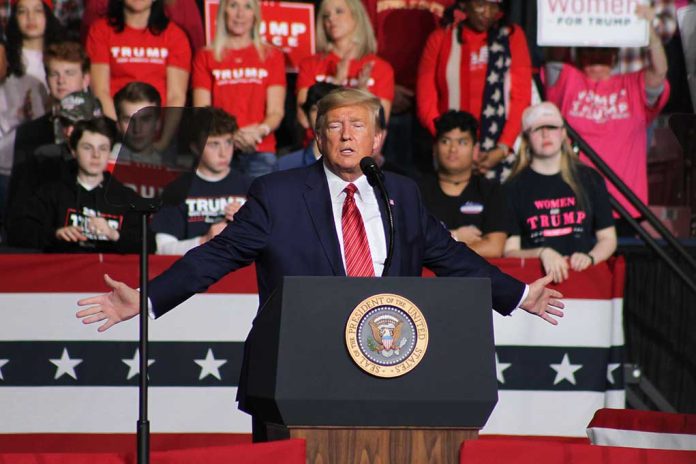
President Trump signs an executive order bringing foreign prescription drugs to Americans’ medicine cabinets while launching measures to strengthen domestic manufacturing.
Key Takeaways
- President Trump’s April 15 executive order aims to lower drug prices by allowing states to import cheaper medications from Canada
- The order streamlines FDA approval processes for generic and biosimilar drugs, potentially reducing prices by up to 80%
- Medicare’s drug negotiation program is being improved, with initial lower prices for 10 drugs starting January 2026
- The administration is working to provide significant discounts on life-saving medications for low-income patients, including insulin for as little as 3 cents per vial
- Trump has initiated a parallel investigation into whether foreign drug imports threaten national security, potentially leading to tariffs
Canadian Imports and Medicare Negotiations
President Trump signed an executive order on April 15, 2025, authorizing states to import lower-cost prescription medications from Canada. This builds upon a framework established in 2020 under section 804 of the Food, Drug and Cosmetics Act, which requires FDA approval for state importation programs. While Florida is currently the only state with authorization after a three-year approval process, the new order directs the FDA to improve and expedite approvals for additional states. The potential impact is significant, as analysis by KFF found U.S. per-capita spending on prescriptions is 42% higher than in Canada.
The executive order also revisits the Medicare drug negotiation program, allowing Medicare to negotiate directly with pharmaceutical companies. Initial lower prices for 10 commonly prescribed medications will take effect on January 1, 2026. Additionally, Medicare’s payment structure for prescription drugs will be adjusted to align with actual supplier costs, addressing current overpayments and passing savings to beneficiaries. The order further instructs the Department of Health and Human Services to reduce costs through improved negotiation processes and transparency measures.
Affordable Life-Saving Medications
A key component of the executive order focuses on providing substantial discounts on critical medications for low-income and uninsured patients. Dr. Mehmet Oz has been directed to further reduce insulin prices, potentially allowing eligible patients to receive insulin for as little as 3 cents per vial. The order also includes special provisions for injectable epinephrine and other life-saving treatments, ensuring fair pricing across various dispensing environments including hospitals, clinics, and pharmacies.
“President Trump is dedicated to creating a transparent, competitive, and fair prescription drug market for American consumers,” The White House wrote.
The order aims to streamline the FDA approval process for generic and biosimilar medications, which has the potential to reduce prices by up to 80% for many commonly prescribed drugs. Health and Human Services Secretary Robert F. Kennedy Jr. has been directed to work with Congress on addressing the pharmaceutical industry’s emphasis on developing expensive large-molecule drugs over less costly small-molecule alternatives, which could further increase affordability and access.
Tariffs and National Security Concerns
In parallel with efforts to import lower-cost medications, President Trump has initiated an investigation to determine if imports of medicines and pharmaceutical ingredients threaten national security. This inquiry is being conducted under Section 232, a legal authority previously used for industries like automobiles and lumber. The president has indicated that pharmaceutical tariffs could come in the “not too distant future,” reflecting his concern about America’s dependence on foreign drug manufacturing.
“We don’t make our own drugs anymore,” Mr. Trump said. “The drug companies are in Ireland, and they’re in lots of other places, China.”
While the president aims to shift production of medicines back to the United States, industry experts note that tariffs alone may not achieve this goal due to the high cost and significant time required to relocate pharmaceutical manufacturing. The dual approach of allowing Canadian imports while potentially imposing tariffs on other foreign producers reflects the administration’s multifaceted strategy to address both affordability and national security concerns in the pharmaceutical supply chain.
🚨 NEW: President Donald J. Trump just signed an Executive Order to expand on the historic efforts of his first term to lower prescription drug prices.
The Order directs the Department of Health and Human Services to take steps to significantly reduce drug prices for American…
— Rapid Response 47 (@RapidResponse47) April 15, 2025
Supply Chain Transparency
The executive order addresses broker practices in the prescription drug supply chain, directing the Department of Labor to establish rules requiring disclosure of broker fees and potential conflicts of interest. This transparency initiative aims to ensure patients receive the full benefit of negotiated discounts and rebates. The order builds on previous efforts from Trump’s first term, including speeding up the development of generics, implementing price transparency rules, and ensuring discounts reach patients directly rather than being captured by intermediaries.
“Today, President Donald J. Trump signed an Executive Order to expand on the historic efforts of his first term to lower prescription drug prices,” wrote The White House.
By targeting both the sourcing and pricing mechanisms in the prescription drug market, President Trump’s executive order represents a comprehensive approach to addressing what has become one of Americans’ most significant healthcare concerns. The multiple measures aim to create immediate relief through importation while simultaneously working toward long-term structural improvements in how medications are priced, negotiated, and manufactured domestically.
Sources:
- Trump’s Tariff Threat for Drug imports Poses Big Political Risks – The New York Times
- Trump signs healthcare executive order that includes a win for pharma companies | Reuters
- Fact Sheet: President Donald J. Trump Announces Actions to Lower Prescription Drug Prices




